

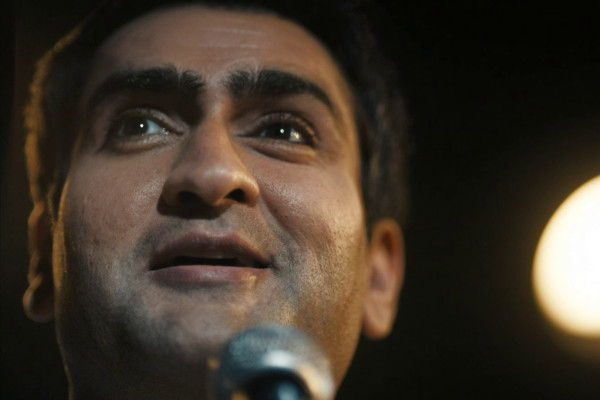
For such a predictable episode, The Comedian does, ironically, stand up better on repeat viewings. Maybe it's that, divorced of the unfair expectations placed upon it as the season premiere, it can be enjoyed on its own terms. Those struggling through the lengthy 54 minute runtime in the hope of a plot twist that they didn't see coming a mile off can at least be rewarded with a fairly engaging character study, featuring Kumail Nanjiani as a failed stand up who turns to the dark side. Sadly, while Nanjiani is fun to watch, his character is so inexplicably dumb that not only does each "twist" take him by surprise, but he's still trying out his poor act about politics even after weeks of it failing to attract a laugh. That he only gets heckled once in the entire runtime can be put down to artistic license.
The real shock with this episode as the opener was that the series went to such surprising lengths to recreate the feel of the original show (down to the logo, theme music and Jordan Peele's excellent channelling of a Serling vibe) only to go out on the first night with such an iconoclastic episode. Although times change, Rod Serling never introduced an episode where a character asked another "could you suck my vagina?" and there are 44 swear words in all, as well as 14 sexualised terms, such as "bitch" and "pussy". While it's apt for the smokey world of comedy night clubs and a look at the trend for dark comedy, it's hard to imagine Jack Klugman pulling up to the mic and questioning how close Burgess Meredith was to his mother.
The new Twilight Zone heavily features the stories of racial minorities in America, and this is a good, different tack to take. However, it can also lead to accidental misfires, such as here, in the tale of two characters of an Indian background... one who only got where she was in the world due to the existence of a white man, the other who become almost psychotic when given a sense of power.
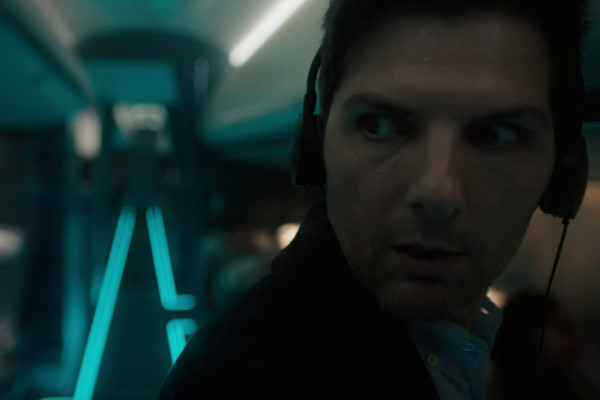
The most disappointing element of this series was that it felt like the makers had pulled a "bait and switch" in regards the extent of Jordan Peele's involvement. With a Super Bowl trailer that played to millions, the writer-director of the very Twilight Zoneish Get Out was placed centrestage, and many (myself included) believed that he would be heavily involved as a creator.
Ultimately, there was no direct suggestion that this would actually be the case, and for most episodes Peele acts only in his three roles as Executive Producer, Developer and Host. Here he gets his only writing credit for the season, a shared "story" credit for this tale which alludes to, but has only passing resemblance to, the original Nightmare at 20,000 Feet from 1963.
As a tale of modern day paranoia, it's fairly inspired, and even has a plot to go with it, something which not all of the episodes present can fully lay claim to. Upon airing, it was an "okay" episode that inspired faith that they might do better... yet as week after week of generally not-awful-but-mediocre episodes took to the airwaves, Nightmare at 30,000 Feet started to rise up this ranking entirely by default. At the time, the line of "oh shit... HE'S the pilot" seemed unforgivably patronising, as if the makers felt the audience didn't have the intelligence to keep up... yet in hindsight it's small change to the insults later episodes threw at the intelligence of its viewership.
Finally, while the only ostensible "remake" episode, the series is filled with references and "easter eggs" to the original Serling show. Sometimes this can be cute, other times it seems pointless, or, as here, a constant distraction. Only hard core fans will note names like Donner and Beaumont, making it hard to comprehend who they're for: 90% of the audience won't have a clue what's being referenced, whereas those in the know, far from being delighted, are more likely to be taken out of the story by this constant meta element, which features here to an unhealthy degree.
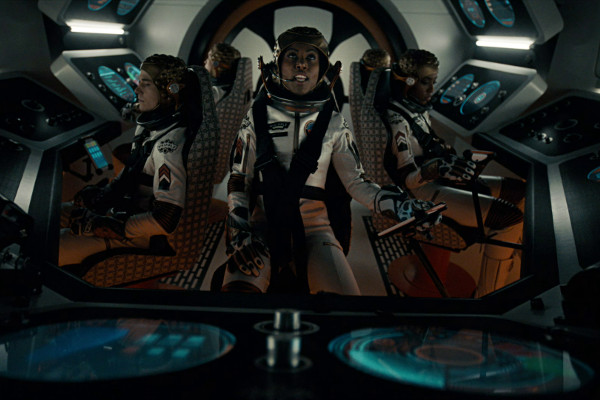
Including titles and "next time" teasers, the episodes of this first season range from 37 to 56 minutes in length (averaging at just under 46), with Six Degrees of Freedom's 54'04 minutes clocking up as one of the three longest entries. Unlike A Traveler and The Comedian, which can drag in spots, this one makes the most of its runtime, creating a paranoid, claustrophobic atmosphere on board a spacecraft fleeing a dying Earth.
Despite the previous week's "next time" trailer showcasing shots that occur well over 40 minutes into the episode, it still manages to keep some intrigue, with many questions asked throughout: Is what they're experiencing real? Has Earth really perished? Will they survive? Despite the script by Heather Anne Campbell and Glen Morgan sometimes feeling a little exposition-heavy, it works reasonably well, and moves forward naturally.
Sadly, the "twist" ending is so flat, and so uninspired, that it takes everything that came before it and retroactively renders it only average entertainment. As its fairly high ranking attests, this is still a pretty good episode, but, out of all ten, it may well be the most disappointing.
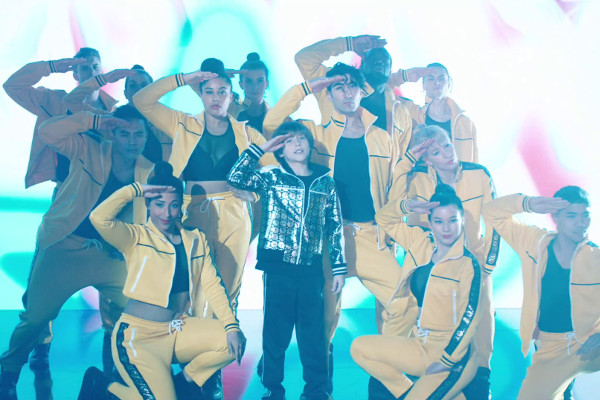
One series continually compared to The Twilight Zone is Charlie Brooker's 2011 Channel 4 TV series Black Mirror. Black Mirror (also reviewed on this site) has since transferred to Netflx and become more of an international show, but the key comparison here is one of the last UK episodes, 2013's The Waldo Moment. In it, an animated blue bear manages to charm the public by cutting through the BS of political life, and The Wunderkind gives us an 11-year-old boy whose straight-talking charms the public via YouTube.
Featuring John Cho from the brilliant Harold and Kumar films, the story starts off very well, with the satire of a child in the Whitehouse not too overplayed. Although said child has a love of golf and demands that his every wish is fulfilled, it's not too overdone, so that the obvious Trump parody remains as sort-of subtext, rather than overt plot replacement.
Sadly, it kind of peters out, shifting into some kind of "It's A Good Presidential Life" rumination, before concluding with no real conclusion, plus the question of what exactly the story does to qualify as an episode of The Twilight Zone. There's nothing that takes place here that, within reason, couldn't take place in real life, yet, had every episode been of this quality, the 2019 Twilight Zone would have perhaps been a little more regarded.
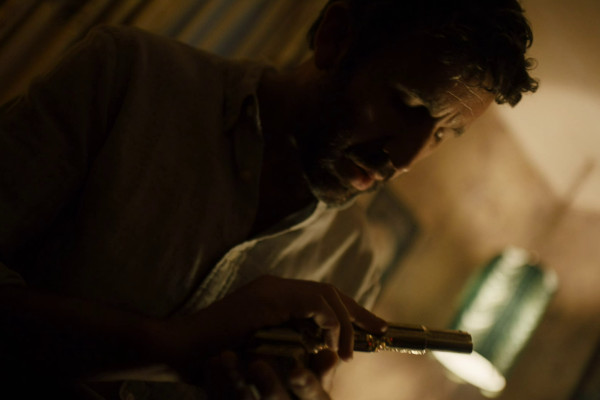
While this revival of The Twilight Zone has, in the main, been disappointing, one thing that has been of note is the quality of the guest cast. Greg Kinnear, Seth Rogen, John Cho and Kumail Nanjiani all make appearances, and there is, despite the generally poor/mediocre quality of the episodes, the sense that the potential for a genuinely great series is still there.
The Blue Scorpion showcases Chris O'Dowd, who not only gives an excellent performance, but becomes that rare thing in a 2019 Twilight Zone episode... a character you can root for. While the original show had its fair share of heels and ne'er-do-wells, CBS All Access generally presented a list of lead characters that ranged from dislikeable to forgettable. O'Dowd roots his unfortunate Jeff Stork as a man you can sympathise with, arguably a first for the series.
Glen Morgan (also writer of A Traveler and co-writer of Six Degrees of Freedom) crafts an episode that makes you wonder where it's going to end up. While there's the sense that his brother Darin could craft something more left-field, and that his climaxes are a little flat, this is his best effort. If you're looking for themes and subtext, then there is an "anti gun" sentiment in the piece, but, compared to most of the other stories, it's left vague and unfoccused, the story instead deciding to centre on the plot and the characters within it. Such things are usually taken for granted, but with this series it's a blessing.
Overall, this first season of the new revival doesn't quite click, but does show promise. It stands up very favourably against the misfiring 2002 revival show, and most of these episodes are better than around 50 of the 110 1980s stories, and comparable with many more. Unfortunately the 1980s series made full use of its core writing team, meaning that while some of the stories were very bad, many more of them were excellent, and almost on a par with the original series. So that while 2019's Twilight Zone compares favourably to the worst and average of the 1980s run, there are also around twenty 1980s episodes that effortlessly eclipse it.
2020's second season is to be welcomed, but it has a lot to improve on from here on in...